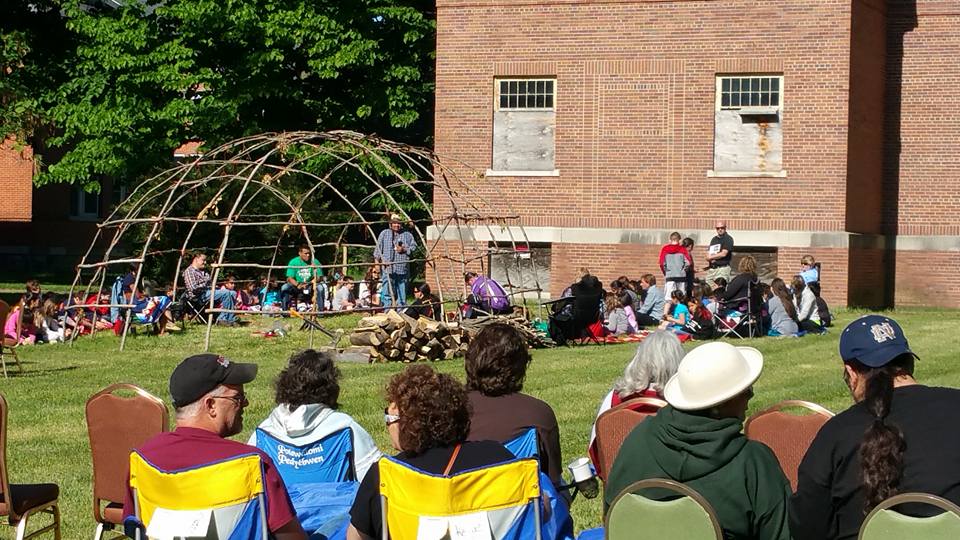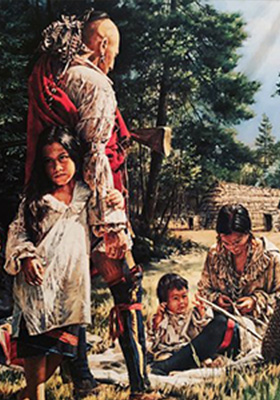The Central Michigan University Chippewas
In 2002, Maynard Kahgegab Jr., then chief of the Saginaw Chippewa Indian Tribe, and Michael Rao, then president of Central Michigan University, signed a proclamation pledging their support for strengthening the relationship between the Saginaw Chippewa Indian Tribe and Central Michigan University “for the enhancement of each other’s goals and visions and for the greater good of all residents of the region, state, and nation.”

The proclamation included a statement of support for the university’s continued use of the Chippewas nickname. CMU’s approach to the Chippewas nickname entails using it in a respectful and honorable manner.
This respectful use of the nickname wasn’t always the case.
CMU started using the Chippewas nickname in 1942 after CMU’s track and field coach Lawrence Sweeney approached the student council to request changing the nickname from the Bearcats to Chippewas. He argued that the Bearcat was too unfamiliar a mascot to provide the kind of atmosphere desired at athletic events and “the Chippewa name opens up unlimited opportunities for pageantry and showmanship.” In practice, this amounted to stereotypical imagery and mockery of indigenous ceremonies.
The mimicking, stereotyping and misrepresentation of indigenous cultures and people are attitudes and behaviors that will not be tolerated and must be part of the past.
Cultural misrepresentation occurs when indigenous sacred objects, cultural ways of knowing, and traditions are used in a context that strips their cultural meaning.
Because CMU proudly uses a nickname associated with contemporary people, every effort is made to avoid engaging in behavior that demeans or belittles indigenous people. Such efforts to ensure the nickname is used properly include CMU copyrighting the Chippewas nickname to gain control over unauthorized use.
CMU’s responsibilities
It is your responsibility as a CMU student or faculty/staff member to use the Chippewas nickname in a respectful and understanding manner. You can learn about this tribal nation’s rich heritage and respectfully use the Chippewas nickname by:
- Always placing "CMU" in front of the Chippewas nickname in order to be respectful of the members of the tribal nation.
- Never use "Chips" outside of the phrase "Fire Up, Chips."
- Taking time to understand the Chippewa culture and history.
- Attending indigenous cultural events.
- Enrolling in a Native American & Indigenous Studies course.
- Knowing the difference between respectful and disrespectful uses of the nickname.
- Refraining from disrespectful behavior such as dressing like an “Indian” or performing the “tomahawk chop.”
- Upon learning the culture and history, let others know what it REALLY means to be a CMU Chippewa.
Know the Saginaw Chippewa Indian Tribe
 The Saginaw Chippewa Indian Tribe of Mount Pleasant, Michigan is comprised mainly of the Saginaw, Black River and Swan Creek
Ojibwe bands. These bands were required to move to the Isabella Indian Reservation.
The Saginaw Chippewa Indian Tribe of Mount Pleasant, Michigan is comprised mainly of the Saginaw, Black River and Swan Creek
Ojibwe bands. These bands were required to move to the Isabella Indian Reservation.
The tribe provides a variety of governmental services to its members, the reservation and surrounding communities. These services include police and fire protection, social and health services, housing and economic development that benefit all of Isabella County.
Jobs
The Saginaw Chippewa Indian Tribe is one of the county’s largest employers.
Seventh Generation Program / Elijah Elk Cultural Center
The Saginaw Chippewa Indian Tribe’s Seventh Generation Program strives to instill traditional Anishinabe values and behavior in the community. The program offers a wide range of cultural/traditional events and activities, including seasonal feasts, woodworking, gardening, stone carving and making maple syrup. The Seventh Generation Program is located at the Elijah Elk Cultural Center, named after the first Tribal Council Chief under the Indian Reorganization Act of 1937.
Community contributions
The Saginaw Chippewa Indian Tribe gives more than $64 million annually to local and state governments and services.
Gaming, entertainment and tourism
The Soaring Eagle Casino and Resort provides economic advantages to the Mount Pleasant area. People who come to enjoy gaming and entertainment often stay in Mount Pleasant’s hotels, eat in its restaurants, and spend money on other forms of entertainment.